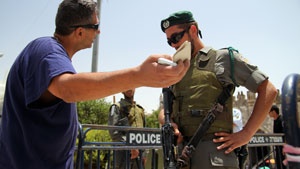Israeli forces announced that Palestinian residents of the West Bank would be permitted to access Jerusalem for Friday prayers during the month of Ramadan if they met certain requirements. Men above 50 and women above 45 can access the city without restriction, while married men over 45 and women over 30 with children can access Jerusalem with the appropriate entry permits.
Although 100,000 worshipers, including 63,000 Palestinians, reportedly attended midday prayers within the Al-Aqsa Mosque compound, the stories of those turned back at Israeli checkpoints highlight the difficulties which the Israeli permit, checkpoint, and ID systems continue to impose on the Palestinian population.
Al-Haq collected testimonies from Palestinians who on that day were denied access to Jerusalem through the Qalandiya military checkpoint between Ramallah and Jerusalem, the only access point for Palestinians living in the Ramallah area and the northern part of West Bank.
The Stories
Ziyad Fahmi Malasa, 45 years old, holds a West Bank ID and lives in Kufr ‘Aqab near the Qalandiya checkpoint. At 11:00 am on 5 August, he arrived at the checkpoint on his way to prayers at Al-Aqsa Mosque to find about 30 armed Israeli soldiers standing behind concrete blocks. They had divided the checkpoint into two sections – one for Palestinian women and one for Palestinian men. He observed soldiers allowing some people through the checkpoint and rejecting others.
Ziyad was refused entry into the checkpoint twice when he presented his ID and West Bank worker’s permit to Israeli soldiers. When a third soldier permitted him to pass he entered the checking area, put his personal items in an X-Ray machine and then showed his ID and worker’s permit to more soldiers sitting behind a glass window. These soldiers said that he would not be able to enter Jerusalem with his identification and instead would need to get a prayer permit from the authorities. After having been denied entry, he retraced his steps and returned to the local mosque in Qalandiya to pray. (See Al-Haq Affidavit 6511/2011)
Jamil Younes Tarwa, 36 years old, is from Sa’ir, Hebron Governorate, and holds a West Bank ID. However, as his wife carries a Jerusalem ID, helives in Shu’afat Refugee Camp, which is situated within the Jerusalem municipal boundary but on the Eastern side of the Annexation Wall (see map below). He has been attempting to apply to the Israeli authorities for a Jerusalem ID for some time but without success.
At 9:00 am on 5 August, Jamil left his house to pray at Al-Aqsa Mosque, his lawyer having advised him that his incomplete ID papers would allow him access through the Shu’afat checkpoint into Jerusalem.After waiting at the checkpoint for about ten minutes, a soldier examined his ID and told him that he would not be allowed into Jerusalem from Shu’afat and instead to try at the Qalandiya checkpoint.
Following the soldier’s advice, Jamil went directly to the Qalandiya checkpoint, which is about an hour by car from his home. When he arrived at Qalandiya, a soldier at the checkpoint refused him entry to Jerusalem a second time. Frustrated by the situation, he returned to Shu’afat Camp to pray in the local mosque. (See Al-Haq Affidavit No. 6512/2011)

‘Abd-al-Hadi Mustafa Ghbariyya left his home in the Jenin Refugee Camp at 3:00 am on 5 August in order to arrive at the Qalandiya checkpoint in time to pass into Jerusalem for prayers. He arrived at Qalandiya at 6:00 am. As he was walking towards an Israeli army officer standing behind a concrete block in front of the checkpoint, an Israeli police officer approached and pushed him back, forbidding him from speaking with the soldier.
‘Abd-al-Hadi then approached a number of other Israeli soldiers, all of whom asked to see his ID card. He told them that he was 44 years old and had not received a permit despite applying multiple times to the Israeli Civil Administration. The soldiers informed him that he must be above 45 years old to be allowed entry with a permit or above 50 years old to be allowed entry without a permit.
‘Abd-al-Hadi had made the journey with the belief that he should be free to visit the Al-Aqsa Mosque, one of the most important holy sites for Palestinian Muslims. The international community has repeatedly affirmed that Israeli forces should allow unimpeded access to the holy sites of Jerusalem. Abd’-al-Hadi gave his testimony as he stood outside the checkpoint, disappointed that he would not be allowed into Jerusalem after his long trip from Jenin. (See Al-Haq Affidavit No. 6509/2011)



 August 1 - 8
August 1 - 8